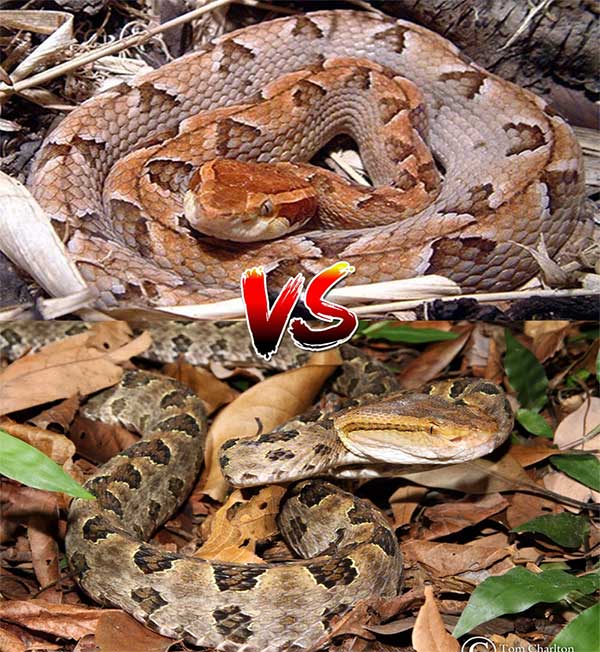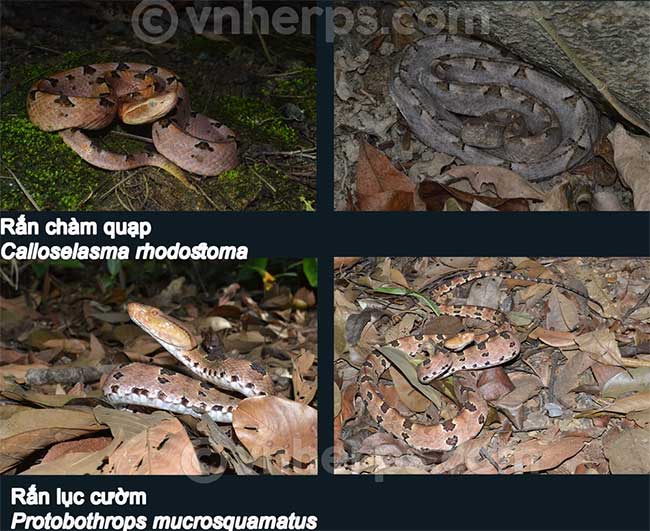The indigo snake is extremely poisonous, but it is easy to be confused with this creature: How to distinguish quickly, very easily!
Both belong to the family Viperidae, so it is easy to confuse.
Beaded viper (scientific name is Protobothrops mucrosquamatus) and indigo snake (scientific name is Calloselasma rhodostoma) are two types of dangerous viper living in our country. They are quite similar in appearance, so it is easy to confuse them.

In your opinion, which is the beaded viper, which is the indigo snake?
Although both belong to the family Viperidae, they belong to two different subfamilies and two genera (genus). In fact, both have distinct morphological and anatomical features that can be easily distinguished by researchers.
However, for most people, they are "similar" to each other, so the following article will help readers easily identify them if they accidentally encounter them. Let's find out more details through the following images.

The two snakes are quite similar in appearance.
1. To identify snakes, geographical location is an extremely important factor. Both species of snakes live in quite separate environments, so where to find the snake can help us identify more accurately.
Specifically, the viper is distributed from the North to Lam Dong province, while the indigo snake is found in the South as far as Gia Lai. Their interference is quite small, the area is from Lam Dong to Gia Lai, so if we find them here, we need to consider the following factors.

The patterns on the backs of the two snakes are very different.
2. Beaded snakes are basically longer, their tails are slimmer and their patterns are especially dense and irregular than those of indigo snakes. In addition, the pattern of the indigo snake has a triangular shape like two butterfly wings or a symmetrical X.
Next is the difference in head scales, beaded vipers have small granular scales on the head (this is a feature for most vipers), while rattlesnakes have plate scales like other snakes. country.

The head scales of rattlesnakes are larger than those of vipers.
We can also identify it by looking at the colored band running behind the corner of the snake's eye. The sides of the viper's head will have a dark band of black, while the indigo snake will have a light band with the cheeks only slightly darker.
The nose of the viper is also quite blunt while the indigo snake is protruding. Above are some quick ways to distinguish these 2 snake species. Both are poisonous snakes that can easily cause necrosis if bitten, so care should be taken when handling.
- The world's most poisonous snakes
- How to distinguish hot and hard snakes
- Africa's most dangerous snake with the sign of death
- How is bitten by poisonous snake, first aid?
- Hornbills swallow African poisonous snakes
- See 'deadly beauty' of poisonous snakes
- The world's most poisonous, ugly snakes
- Serious poisonous soap bites make the victim urinate blood
- Surprised by the sight of the only poisonous snake in Britain 'crying out'
- How to distinguish poisonous snakes and non-toxic snakes
- Discover a new poisonous sea snake
- The venomous snake sees the dried branches in Vietnam
 Animal 'suffering' after hibernation
Animal 'suffering' after hibernation Why do goats climb well?
Why do goats climb well? Scientists were surprised to see chimpanzees eating turtles
Scientists were surprised to see chimpanzees eating turtles Giant catfish died deadly due to drought in Thailand
Giant catfish died deadly due to drought in Thailand